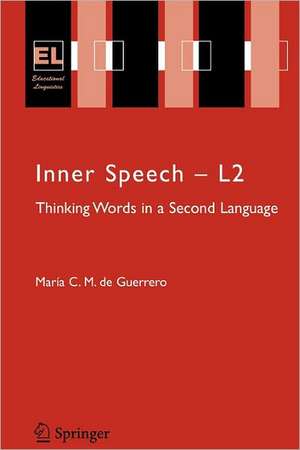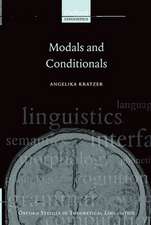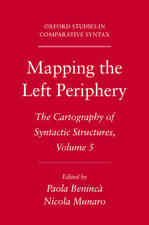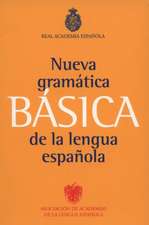Inner Speech - L2: Thinking Words in a Second Language: Educational Linguistics, cartea 6
Autor Maria C.M. de Guerreroen Limba Engleză Paperback – 8 dec 2010
| Toate formatele și edițiile | Preț | Express |
|---|---|---|
| Paperback (1) | 780.06 lei 6-8 săpt. | |
| Springer Us – 8 dec 2010 | 780.06 lei 6-8 săpt. | |
| Hardback (1) | 645.79 lei 6-8 săpt. | |
| Springer Us – 20 apr 2005 | 645.79 lei 6-8 săpt. |
Din seria Educational Linguistics
- 18%
 Preț: 959.98 lei
Preț: 959.98 lei - 15%
 Preț: 644.95 lei
Preț: 644.95 lei - 20%
 Preț: 495.50 lei
Preț: 495.50 lei - 18%
 Preț: 952.26 lei
Preț: 952.26 lei - 15%
 Preț: 649.87 lei
Preț: 649.87 lei - 18%
 Preț: 888.18 lei
Preț: 888.18 lei - 15%
 Preț: 644.95 lei
Preț: 644.95 lei - 15%
 Preț: 636.80 lei
Preț: 636.80 lei - 15%
 Preț: 634.49 lei
Preț: 634.49 lei - 20%
 Preț: 555.53 lei
Preț: 555.53 lei - 18%
 Preț: 940.72 lei
Preț: 940.72 lei - 20%
 Preț: 563.98 lei
Preț: 563.98 lei - 15%
 Preț: 638.57 lei
Preț: 638.57 lei - 20%
 Preț: 568.44 lei
Preț: 568.44 lei - 15%
 Preț: 642.83 lei
Preț: 642.83 lei - 15%
 Preț: 643.48 lei
Preț: 643.48 lei - 18%
 Preț: 899.52 lei
Preț: 899.52 lei - 15%
 Preț: 638.76 lei
Preț: 638.76 lei - 15%
 Preț: 649.06 lei
Preț: 649.06 lei - 15%
 Preț: 643.65 lei
Preț: 643.65 lei -
 Preț: 390.08 lei
Preț: 390.08 lei - 15%
 Preț: 645.28 lei
Preț: 645.28 lei -
 Preț: 393.52 lei
Preț: 393.52 lei - 15%
 Preț: 649.39 lei
Preț: 649.39 lei -
 Preț: 392.75 lei
Preț: 392.75 lei - 18%
 Preț: 897.65 lei
Preț: 897.65 lei -
 Preț: 393.13 lei
Preț: 393.13 lei - 18%
 Preț: 728.28 lei
Preț: 728.28 lei - 15%
 Preț: 638.43 lei
Preț: 638.43 lei - 18%
 Preț: 1113.39 lei
Preț: 1113.39 lei
Preț: 780.06 lei
Preț vechi: 951.29 lei
-18% Nou
Puncte Express: 1170
Preț estimativ în valută:
149.28€ • 155.28$ • 123.24£
149.28€ • 155.28$ • 123.24£
Carte tipărită la comandă
Livrare economică 15-29 aprilie
Preluare comenzi: 021 569.72.76
Specificații
ISBN-13: 9781441937544
ISBN-10: 1441937544
Pagini: 272
Ilustrații: XVIII, 252 p.
Dimensiuni: 155 x 235 x 14 mm
Greutate: 0.39 kg
Ediția:Softcover reprint of hardcover 1st ed. 2005
Editura: Springer Us
Colecția Springer
Seria Educational Linguistics
Locul publicării:New York, NY, United States
ISBN-10: 1441937544
Pagini: 272
Ilustrații: XVIII, 252 p.
Dimensiuni: 155 x 235 x 14 mm
Greutate: 0.39 kg
Ediția:Softcover reprint of hardcover 1st ed. 2005
Editura: Springer Us
Colecția Springer
Seria Educational Linguistics
Locul publicării:New York, NY, United States
Public țintă
ResearchCuprins
Understanding Inner Speech.- Thinking Words in One's First Language.- Thinking Words in a Second Language.- Methodology of Research on Inner Speech.- L2 Inner Speech: What Learners Say.- An Integrated View of the Origin, Nature, and Development of L2 Inner Speech.- Developing L2 Inner Speech: A Pedagogical Perspective.- Synthesis and Directions for Further Research.
Recenzii
From the reviews:
"Inner Speech-L2 is a comprehensive, well-written, and in-depth treatment of the complex topic of inner speech and its relevance for the filed of second language acquisition (SLA) … . De Guerrero has provided the field with a solid and rich monograph on inner speech. Any researcher interested in the issue of thinking in an L2 and the complexities of the topic of language for thought and language of thought should read it." (Eduardo Negueruela, Modern Language Journal, Vol. 91 (4), 2007)
"The book pinpoints the features of second language (L2) inner speech and analyses the processes which trigger its development. … The book is addressed to scholars with a specific interest in sociocultural theory application, to researchers, educators, and students in the fields of L2 and Foreign Language (FL) learning, applied linguistics, language and cognition, and psycholinguistics. It might also be a useful resource book for those interested in gaining an understanding of the role played by inner speech in mediating language and thought." (Anna Franca Plastina, The Linguist List, February, 2008)
"Inner Speech-L2 is a comprehensive, well-written, and in-depth treatment of the complex topic of inner speech and its relevance for the filed of second language acquisition (SLA) … . De Guerrero has provided the field with a solid and rich monograph on inner speech. Any researcher interested in the issue of thinking in an L2 and the complexities of the topic of language for thought and language of thought should read it." (Eduardo Negueruela, Modern Language Journal, Vol. 91 (4), 2007)
"The book pinpoints the features of second language (L2) inner speech and analyses the processes which trigger its development. … The book is addressed to scholars with a specific interest in sociocultural theory application, to researchers, educators, and students in the fields of L2 and Foreign Language (FL) learning, applied linguistics, language and cognition, and psycholinguistics. It might also be a useful resource book for those interested in gaining an understanding of the role played by inner speech in mediating language and thought." (Anna Franca Plastina, The Linguist List, February, 2008)
Notă biografică
María C. M. de Guerrero has vast experience as a professional in the field of second language teaching and learning. She has taught EFL/ESL for over thirty years in Argentina and Puerto Rico and offers courses in psycholinguistics and research methods at the graduate level. She works at the English Department of Inter American University of Puerto Rico, Metropolitan Campus. She has published articles in The Modern Language Journal, Applied Linguistics, Language Teaching Research, TESOL Quarterly, Issues in Applied Linguistics, the International Journal of Applied Linguistics, the Journal of Second Language Writing, Foreign Language Annals, and in the edited volumes Vygotskyan Approaches to Second Language Research (Ablex) and Applied Linguistics and Language Teacher Education (Springer).
Textul de pe ultima copertă
The purpose of this book is to explore "inner speech" and its connections to second language (L2) learning. Inner speech, or silent self-directed speaking, enables the faculty to "think" words and is the main instrument for verbal thought. Inner speech originates in first language (L1) social discourse and develops in childhood through a process of internalization. In this book it is postulated that, given certain conditions of L2 learning, it is possible to develop L2 inner speech as a result of the interiorization of L2 social speech. Inner speech has been quite extensively investigated from an L1 perspective. The L2 acquisition field, however, has been slow in acknowledging the importance of inner speech in learning another language. Although within the past decade there have been some notable efforts to explore the topic from an L2 point of view, these efforts have remained in the form of isolated articles and short sections in larger volumes. This book reviews the extant literature on L1-L2 inner speech in its attempt to offer a coherent and comprehensive account of the phenomenon. The book draws mainly from Vygotskyan sociocultural theory for insights into the nature of L2 inner speech and the processes that engender it and characterize its development. The pedagogical implications of recognizing the crucial role inner speech plays in L2 learning are also addressed.
Inner Speech – L2 comprises a discussion of the historical and theoretical foundations of the concept of inner speech; a review of studies related to L1 and L2 inner speech and its methodology of research; an interpretive account of the origin, nature, and development of L2 inner speech from a sociocultural theory point of view; and various pedagogical implications and suggestions for further research.
Inner Speech – L2 comprises a discussion of the historical and theoretical foundations of the concept of inner speech; a review of studies related to L1 and L2 inner speech and its methodology of research; an interpretive account of the origin, nature, and development of L2 inner speech from a sociocultural theory point of view; and various pedagogical implications and suggestions for further research.
Caracteristici
Only book devoted wholly to the topic of "inner speech in the second language." It facilitates the work of researchers who are interested in the inner speech-L2 connection inasmuch as it gathers, updates, and examines all the existing references on the topic Valuable for those interested in incorporating sociocultural theory readings and the methodology of research in the field within their courses














